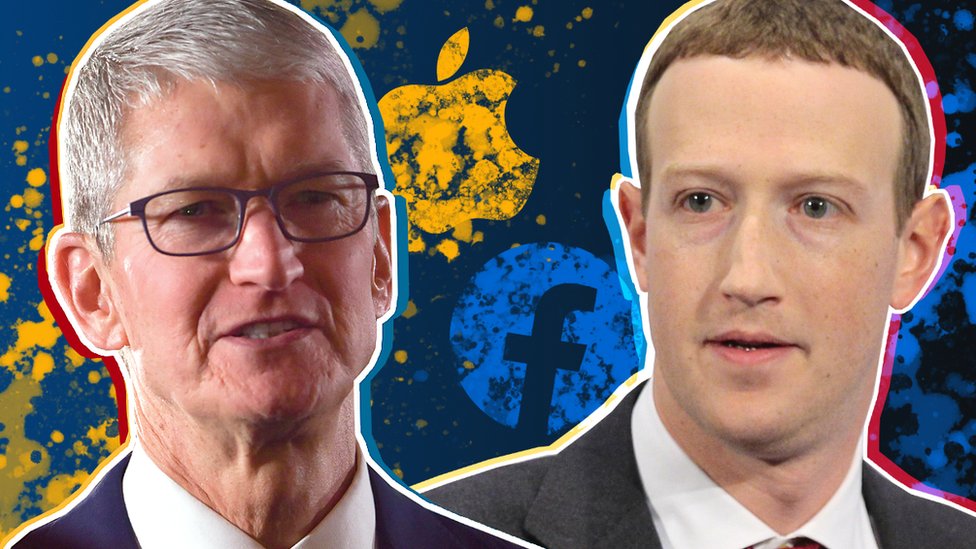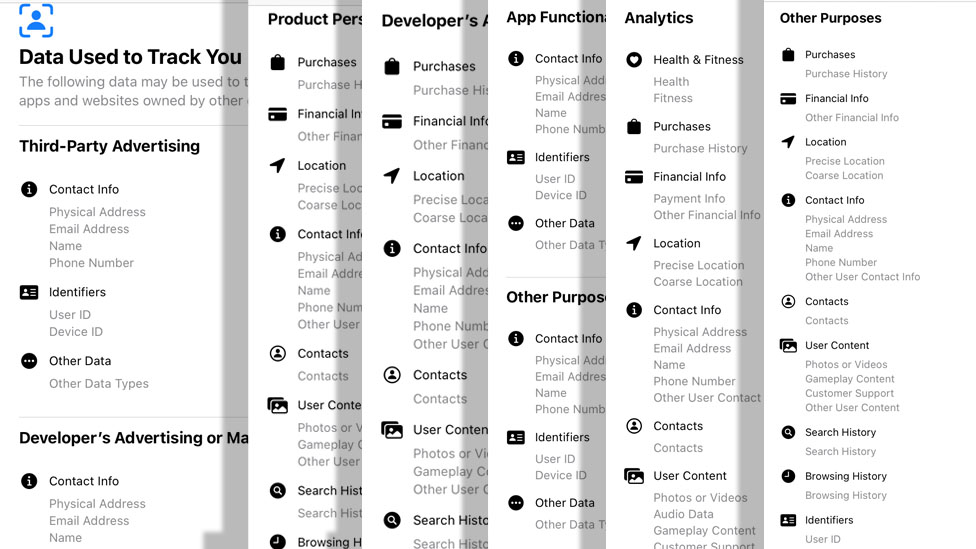
Facebook has launched a public offensive against Apple, dragging a long-simmering row between the two tech giants into the public sphere.
Earlier this year, Apple announced it planned to ask users if they want their data to be shared for targeted, personalised advertising.
The move is likely to hurt Facebook, which has warned it could cut the money earned through its ad network by half.
But Facebook is portraying itself as "speaking up for small businesses".
A blog post from Dan Levy, vice-president of ads, suggested that Facebook needs it to be possible to track users' activities across other apps and websites, in order to help its advertisers target their posts at those people who would most likely be responsive.
As a result, he said, preventing this from happening "truly impacts" not Facebook, but local businesses - like a coffee shop, small retail, or a start-up event planner - because they would not be able to afford campaigns that would need to be seen by more people to generate the same amount of sales.
"Yes, there will be an impact to Facebook's diversified ads business, but it will be much less than what will befall small businesses," Mr Levy wrote.
The tech giant took out full-page adverts in some print newspapers as part of its PR blitz. It also hosted a news conference in which it presented small business owners making its case.
NEW: The Facebook v Apple war continues, now with full-page newspaper ads.
Facebook took out ads in the NYT, WSJ and WaPo today attacking Apple’s expected iOS 14 changes that will make it harder to collect data for targeted advertising https://t.co/vvNkU5jjZ2 pic.twitter.com/SxTdrCJVMb
— Kurt Wagner (@KurtWagner8) December 16, 2020
Facebook alleged Apple's move is about forcing people to use Apple's own advertising platform, which it claims is exempt from the new rules - something Apple denies.
It also argues that digital content like apps will need to move to payments and subscriptions instead of advertising - which Apple takes a 30% cut of on iPhones.
Apple refutes such allegations, and believes Facebook is trying to deflect attention from scrutiny of its own businesses practices.
"Some companies are going to do everything they can to stop the App Tracking Transparency feature... or any innovation like it, and to maintain their unfettered access to people's data," said the firm's software chief Craig Federighi in a recent speech.
"To say that we're sceptical of those claims would be an understatement."
But one expert warned both businesses were taking a risk by making this row public.
"Both companies may be playing with fire here," commented Stephanie Hare, author of the forthcoming book Technology Ethics.
"Facebook is already being sued by the Federal Trade Commission, 46 states and two jurisdictions for antitrust, and so is trying to play the victim here.
"But if it can make a case that Apple is also abusing its position, we could see another Big Tech company in the regulators' crosshairs."
Privacy v publishers
Apple has, for years, promoted privacy as one of the key features of its phones and other products, making small adjustments and bringing in new features it says improve user privacy.
The latest of these are notices in its App Store that list what data each product collects, which in Facebook's case has led to a very lengthy list.

But its decision to ban one type of tracking has the potential to upend a part of the advertising market when it arrives early next year.
In testing earlier this year, Facebook said it found that revenue for publishers dropped 50% when personalisation was not an option in ad campaigns.
And as part of its campaign against Apple, Facebook enlisted a series of small business owners as case studies, claiming the ability to run personalised ads had been key to their business success.


Full page ads in newspapers and a press conference featuring heartrending stories from small business owners saying they would not have got through the pandemic without using Facebook's targeted ads - the social media giant obviously means business in its battle with Apple.
"This is about control of the internet," said a Facebook executive at the press conference, referring to Apple's motives for putting enhanced privacy controls in its latest operating system. But many will see this as the social media giant battling to preserve a business model for the internet that favours its bottom line at the expense of users.
"Save our personalised ads" may be a battle cry for small businesses but it won't have much resonance for the millions of Facebook users who worry about just how their data is used - or for the newspapers whose classified ad business has vanished since Mark Zuckerberg came up with a bright idea to connect people.
Whether Apple's motives are pure in its battle to make our online activities more private is questionable - its App Store makes vast revenues from commission on in-app purchases rather than ads. But in the court of public opinion, a war between a social media company with a major trust deficit and a business promising to put people back in charge of their data is only likely to end one way.
https://news.google.com/__i/rss/rd/articles/CBMiLmh0dHBzOi8vd3d3LmJiYy5jby51ay9uZXdzL3RlY2hub2xvZ3ktNTUzMzk1NjnSATJodHRwczovL3d3dy5iYmMuY28udWsvbmV3cy9hbXAvdGVjaG5vbG9neS01NTMzOTU2OQ?oc=5
2020-12-16 18:57:00Z
52781246124683
Tidak ada komentar:
Posting Komentar